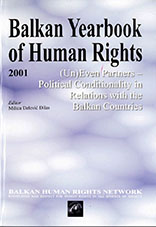Human Rights in the OSCE Framework: Between Implementation of Assumed Obligations and Conditionality
Human Rights in the OSCE Framework: Between Implementation of Assumed Obligations and Conditionality
Author(s): Branislav MilinkovićSubject(s): Law, Constitution, Jurisprudence
Published by: Balkan Human Rights Network
Summary/Abstract: The Charter for European Security, the fundamental document of the post-Cold War OSCE adopted at a summit meeting held in Istanbul in November 1999, reaffirms the commitment of the participating countries to an OSCE as a ,regional arrangement under Chapter VII of the Charter of the United Nations", and defines the OSCE itself as a ,key instrument for early warning, conflict prevention, crisis management and post-conflict rehabilitation." The activities of the OSCE on the realisation of these objectives are based on a concept of comprehensive security, according to which observance of human rights is an integral part of security in Europe, together with economic and military aspects. The Charter for European Security establishes this link when it says that ,peace and security in our region is best guaranteed by the willingness and ability of each participating country to uphold democracy, the rule of law and respect for human rights" (item 14), and the assertion that ,respect for human rights and fundamental freedoms, democracy and the rule of law is at the very core of the OSCE's comprehensive concept of security" (item 19).
Journal: Yearbook of the Balkan Human Rights Network
- Issue Year: 2001
- Issue No: 01
- Page Range: 187-201
- Page Count: 15
- Language: English

